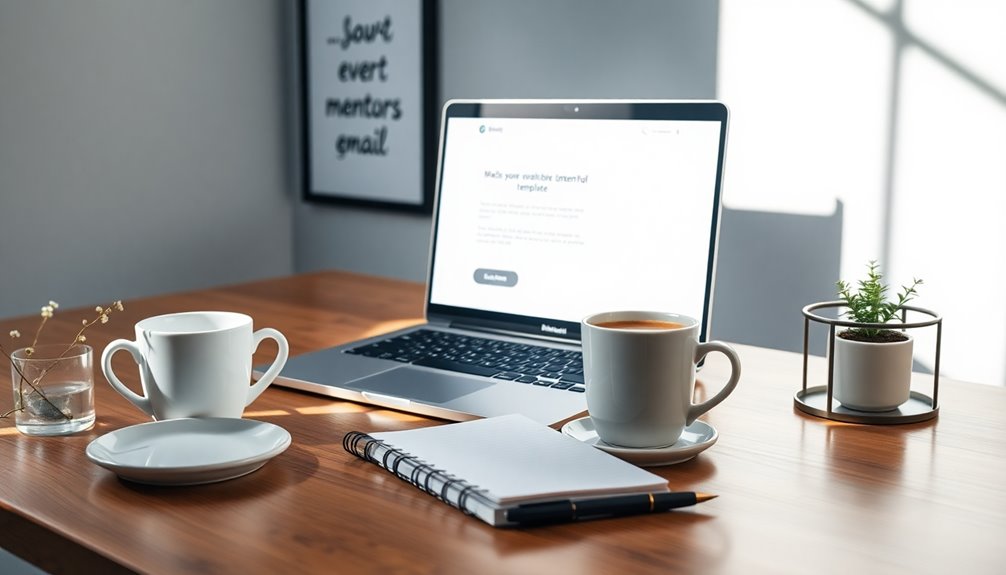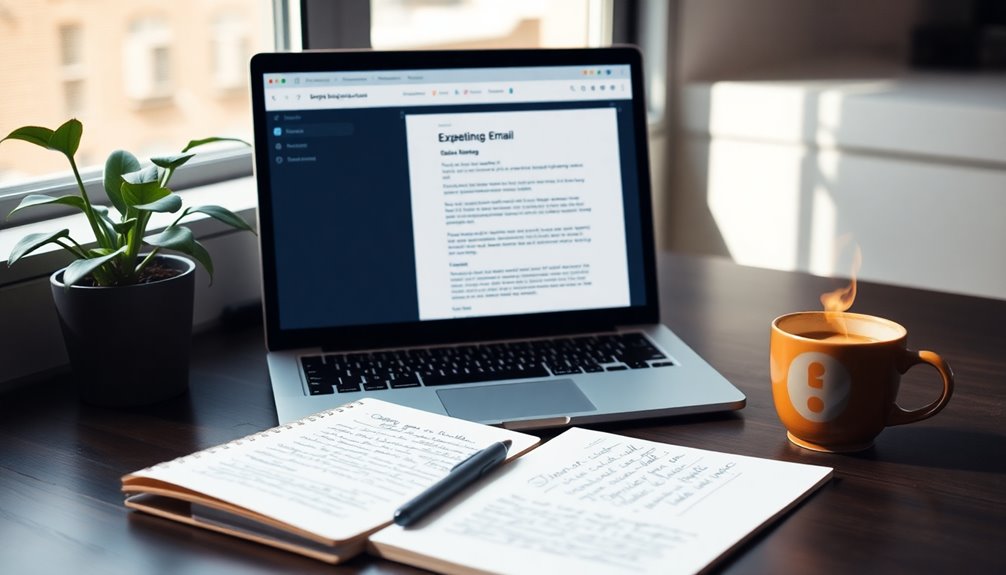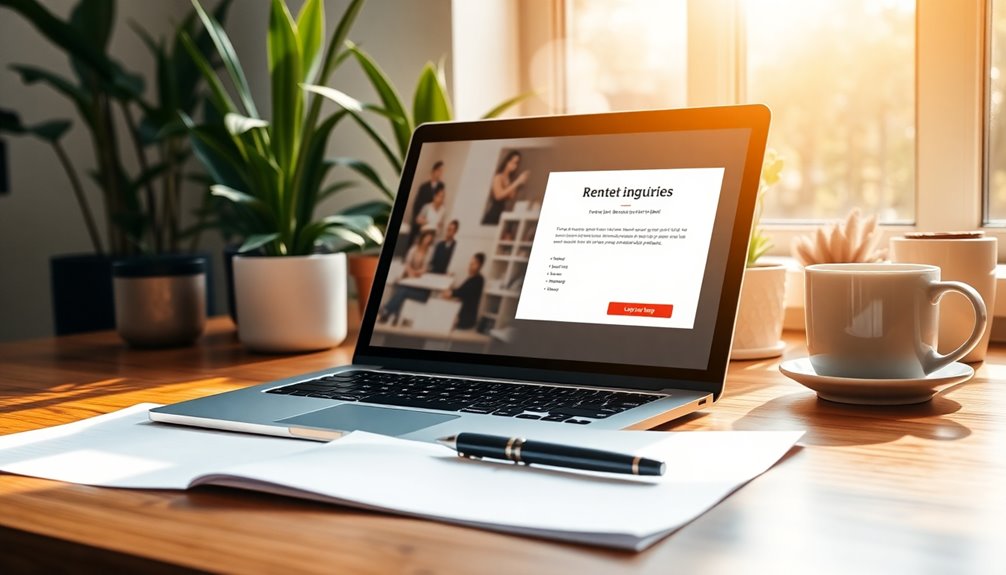To make a lasting impression with your mentor email, start by personalizing your introduction. Use their name, mention your background, and highlight shared interests or relevant skills. Clearly express admiration for their achievements and explain how you discovered them. Keep your message concise, aiming for clarity and relevance. Suggest flexible meeting times for a virtual coffee chat, showing respect for their schedule. Lastly, include a warm closing that reiterates your gratitude and eagerness to learn from them. If you're curious about crafting the perfect subject line or common pitfalls, keep going for more insights!
Key Takeaways
- Personalize your email by addressing the mentor by name and referencing their specific projects or achievements that resonate with your interests.
- Clearly state your purpose for reaching out, highlighting your relevant skills and how they align with the mentor's expertise.
- Express genuine gratitude for the mentor's contributions to the field and their potential support in your career journey.
- Keep your message concise, focusing on key points and maintaining a respectful tone regarding the mentor's time.
- Suggest flexible meeting times to facilitate scheduling, demonstrating your willingness to accommodate the mentor's busy schedule.
Introduction
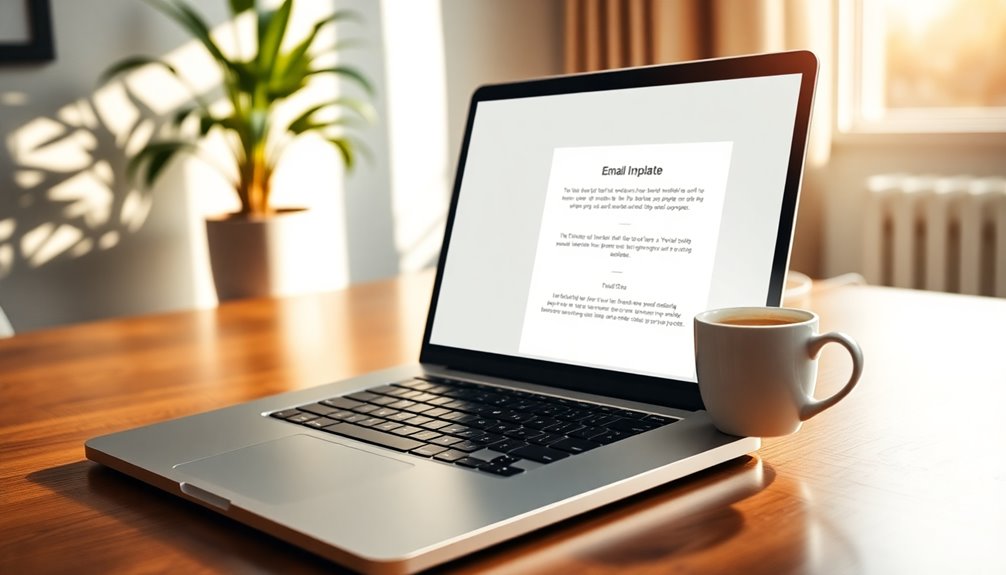
When reaching out to a mentor, kick off your email with a strong introduction that sets the stage. Start by briefly stating your name, current role, and location to establish context and identity. This initial information helps the mentor quickly understand who you are.
Next, highlight relevant skills or interests that align with the mentor's expertise. This connection not only showcases your purpose but also makes it easier for the mentor to see how they can assist you. Be sure to express how you discovered the mentor—whether through articles, projects, or recommendations. Personalizing your outreach makes a lasting impression and shows genuine interest.
Additionally, don't hesitate to express admiration for the mentor's achievements or contributions. This respect for their work can strengthen your introduction and reinforce your desire to learn from them.
Lastly, tailor your introduction to reflect the mentor's preferred communication style, ensuring your approach resonates with them. By carefully crafting this introduction, you'll appreciate the importance of making a strong first impression that sets a positive tone for your mentorship journey.
Builds Meaningful Connections
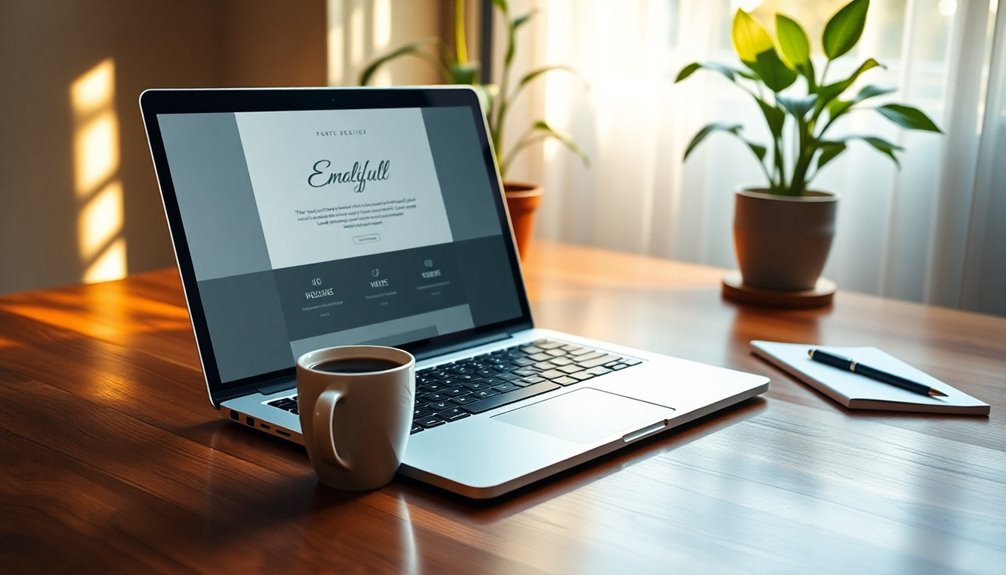
Building meaningful connections with your mentor starts with expressing genuine appreciation for their expertise. When you acknowledge their achievements, you not only show respect but also lay the groundwork for a strong relationship. Engaging in nighttime meditation can also enhance your focus and clarity, allowing you to truly appreciate their insights.
Take the time to express your gratitude for their guidance, as this can have a positive impact on your career development. Incorporate specific references to their work or projects they've contributed to, demonstrating your genuine interest. This personalization enhances your connection and shows that you value their insights.
Clearly articulate the purpose of your email, whether it's seeking advice on a specific issue or discussing your goals. This helps your mentor understand how they can significantly impact your journey. Also, remember to acknowledge their time and contributions. By doing so, you reinforce the respect and appreciation you hold for them.
Following up with updates on your progress or insights gained from your interactions further solidifies this connection, showcasing your commitment to the relationship. Ultimately, these actions not only create a lasting impression but also foster deeper connections that can benefit both you and your mentor in the long run. Additionally, engaging with your mentor can enhance your self-awareness, enabling you to better understand your strengths and areas for growth.
Personalize Your Subject Line
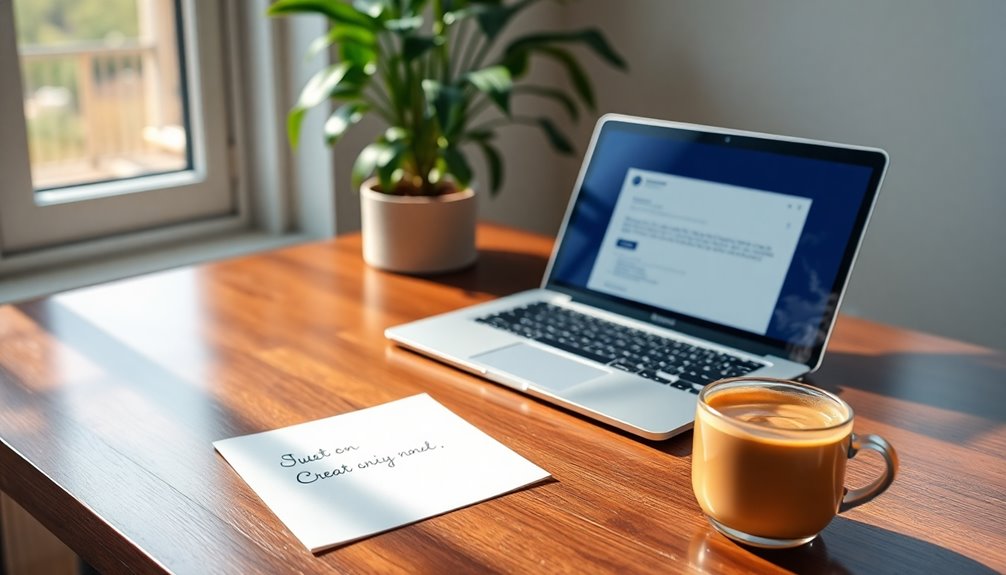
A personalized subject line is your first chance to grab your mentor's attention, so make it count. By taking the time to personalize your subject line, you can significantly increase your email's open rates—by up to 26%!
Start by including your potential mentor's name or referencing their work. This creates a personal connection and shows genuine interest.
Make it easy for your mentor to see the value in your email. Clearly state the purpose of your message in a concise manner. Avoid generic phrases that could apply to anyone; instead, highlight what makes your request unique.
For example, you might say, "Appreciating Your Insights on [Specific Topic]". This not only expresses your appreciation but also sets the tone for a good first impression.
Crafting a Personalized Approach
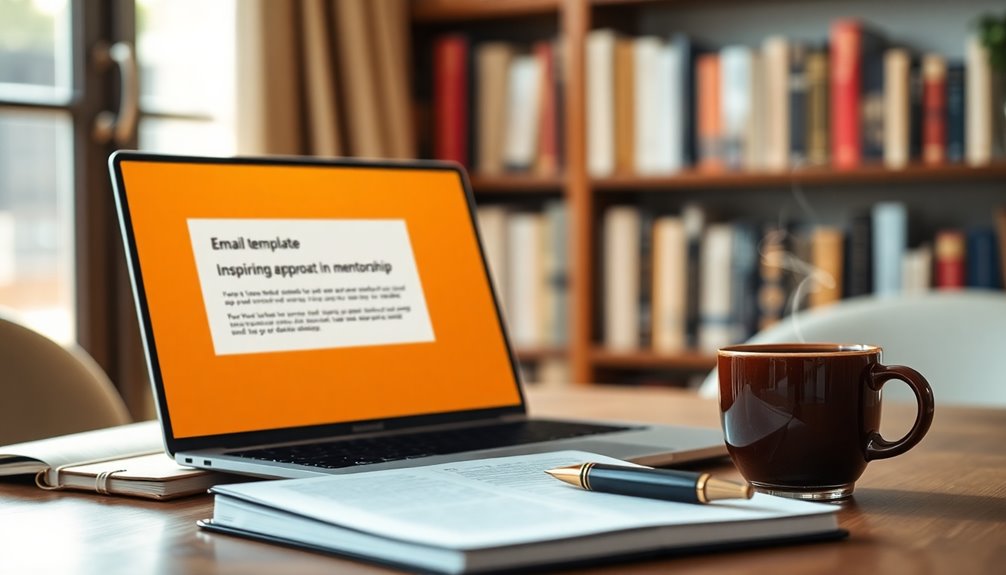
To truly connect with your mentor, dive into their work and pull out specifics that resonate with you. Personalizing the email shows that you're genuinely interested in their expertise. Mention specific projects or articles they've authored, which can reinforce your admiration and appreciation for their contributions. A heartfelt thank-you for their work not only expresses gratitude but also sets a positive tone for your message.
Research their background to tailor your approach and reflect their unique skills and preferred communication style. This demonstrates respect and thoughtfulness. Use an engaging opening sentence that highlights a shared interest or connection to make a memorable first impression. Curiosity can enhance your ability to connect with others, making your email more impactful.
Incorporate relevant skills and experiences that align with their field to establish common ground. This can help you frame your request for guidance more effectively. If they've received accolades or made significant contributions, mention those as well, as it reinforces the value you place on their industry insights. Additionally, consider referencing their involvement in celebrity lifestyle trends to illustrate your awareness of their impact within the industry.
Pro Tips for Maximizing Impact

Maximizing the impact of your mentorship request hinges on clarity and respect for the mentor's time. Start your letter by personalizing it; reference specific projects or articles by the mentor. This shows genuine interest and helps you connect on a deeper level. Clearly articulate your objectives for seeking mentorship, ensuring they align with the mentor's expertise. This targeted approach makes your request more productive and effective.
Keep your email concise—150-250 words is ideal. This helps maintain readability and demonstrates that you value the mentor's time. Include a clear call to action, suggesting a brief virtual coffee chat to establish a manageable connection. A time-limited commitment makes it easier for them to say yes.
If you don't hear back, follow up respectfully after 1-2 weeks. Reiterate your interest and express gratitude for their time and insights.
Remember to send thank-you letters after any interaction, as they leave a lasting impression. By following these tips, you're not just making a request; you're setting the stage for a meaningful mentorship that you both can benefit from.
You'll look forward to hearing back!
Common Mistakes to Avoid
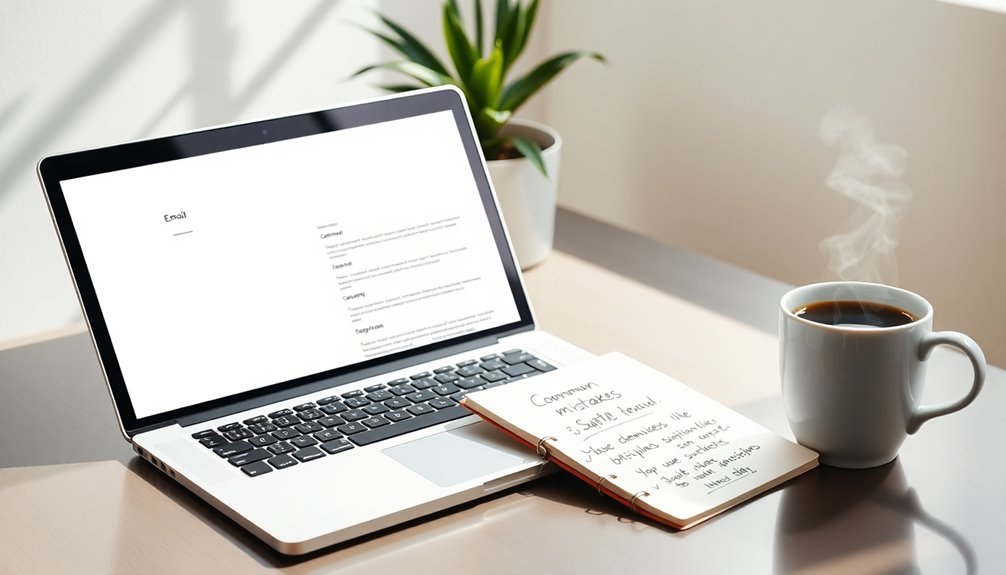
Many new mentees make common mistakes that can hinder their chances of securing a mentorship. One major pitfall is sending a lengthy email to a mentor. Aim for a concise message of 150-250 words to enhance readability.
Also, avoid overusing jargon; keep your language clear and straightforward to ensure your mentor understands your intentions.
Personalization is key when crafting your email. A generic message may fail to engage potential mentors, so take time to reflect your genuine interest in their work and expertise. Additionally, don't forget the importance of a compelling subject line—this can significantly impact whether your email gets opened.
After sending your email, it's crucial to follow up. Ignoring this step can result in missed opportunities. A polite follow-up after a week shows your continued interest and commitment to the mentorship.
Lastly, consider your timing. Sending emails at suboptimal times, like weekends or late evenings, can reduce your chances of a response. Instead, aim for mid-week mornings.
Mentor Outreach Email Template

Crafting an effective mentor outreach email can set the tone for a positive mentorship relationship. Start with a personalized greeting and briefly introduce yourself, including your name, current role, and relevant background. This establishes rapport right away.
Next, clearly articulate the purpose of your email. Specify the guidance or insights you're seeking, making it easy for the mentor to understand how they can assist you.
Make sure to include specific references to the mentor's achievements or projects. This shows genuine interest and research on your part, making your email feel tailored.
Propose a flexible arrangement for a call or meeting, suggesting potential times that accommodate the mentor's schedule. This approach demonstrates respect for their time.
As you wrap up, express gratitude for their time and consideration. Reinforce your appreciation for their potential support and mention you look forward to connecting.
Final Thoughts
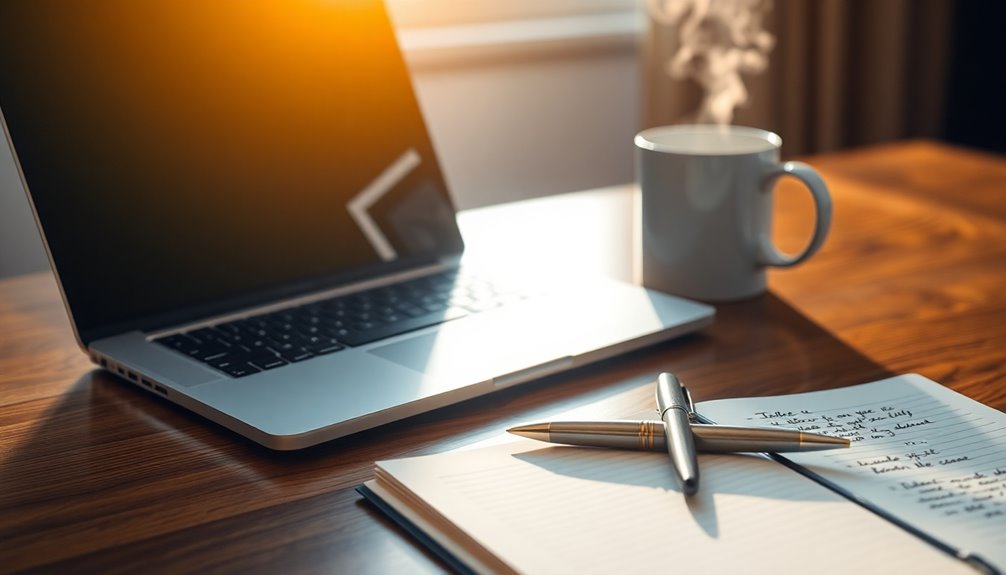
While reaching out to a potential mentor may feel daunting, taking the time to personalize your email can make all the difference in building a meaningful connection. You've done your homework, and by referencing their work or achievements, you show genuine interest that can increase your chances of a positive response. Awareness of small mistakes during this process can enhance personal growth.
Remember, mentors are often busy, so keeping your email concise helps maintain their attention.
As you express your hope to gain insights or advice, consider how you can give something back, whether through feedback or sharing your own experiences. This reciprocity lays the groundwork for a mutually beneficial relationship. Moreover, expressing your desire to develop strong communication skills can convey your commitment to professional growth and effective collaboration.
Don't forget to express gratitude for their time and insights, as this fosters goodwill and shows you respect their efforts.
After sending your initial email, follow up after a week to demonstrate your persistence and commitment. This gentle reminder can keep your request at the forefront of their mind.
Frequently Asked Questions
How to Write a Professional Email to a Mentor?
To write a professional email to a mentor, start with a warm greeting, clearly state your purpose, reference their achievements, keep it concise, and proofread for accuracy. Don't forget to include a clear call to action!
How Do You Express Gratitude to a Mentor?
You express gratitude to a mentor by highlighting their specific guidance, sharing personal anecdotes, and acknowledging their time and effort. Use warm, genuine language to strengthen your relationship and convey how much their support matters.
How Do You Write a Positive Feedback for Mentor?
To write positive feedback for your mentor, focus on specific examples of their impact on your growth. Highlight their unique qualities, express gratitude for their support, and emphasize your desire to maintain your relationship moving forward.
How Do I Introduce Myself as a Mentor?
To introduce yourself as a mentor, share your name and current role, highlight relevant skills and experiences, mention key achievements, and connect on shared interests to establish rapport and credibility with your mentee.
